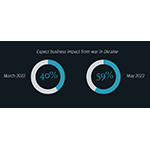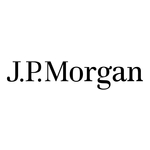German Mittelstand Leaders Skilfully Navigate Global Issues, Supply Chain Challenges and Ongoing Labour Shortages, Second Annual J.P. Morgan Survey Finds

Mittelstand companies face inevitable uncertainty, business challenges and rising geopolitical tensions head-on in the year ahead
FRANKFURT, Germany–(BUSINESS WIRE)–Nearly all (95%) German Mittelstand leaders expect business repercussions from the war in Ukraine for at least six months, up 14% from March, citing higher energy prices (50%), commodity prices (47%) and inflation (38%) as the top impacts, according to J.P. Morgan’s second annual German Business Leaders Outlook survey released today.
“Unsurprisingly, business leaders expect impacts from the war, but we believe Mittelstand companies are resilient and have the platform to grow their businesses as they overcome obstacles and navigate significant uncertainties,” said Bernhard Brinker, Head of Commercial Banking, J.P. Morgan DACH Region.
J.P. Morgan found that the Mittelstand community has notable concerns to navigate in the year ahead after surveying more than 240 senior executives of German Mittelstand companies in both March and May in response to changing geopolitical and macro-economic events. In fact, nearly six in ten (58%) Mittelstand leaders cite higher and rising costs as the number one challenge they’re facing right now. And with rising energy prices cited as a top concern for the year ahead (25%) and a top impact from the war (50%), it comes to no surprise that when asked which areas the German government should focus on over the next 12 months, more than half (54%) rated reducing energy prices, followed by general infrastructure investments (39%).
“While the business environment may be uncertain for the foreseeable future, we know and continue to see that the Mittelstand community is strong and will keep pushing their businesses forward,” said Stefan Povaly, Head of J.P. Morgan Germany.
Navigating Shifting Business Concerns, Seeking Growth
Ongoing supply chain issues (14%) were cited as another challenge for Mittelstand leaders, and as a result, German companies are likely to increase their prices for goods and services (39%) according to the most recent data in the year ahead. Additional top business challenges for Mittelstand companies include higher costs of doing business (22%) and inflation (16%).
In the face of these challenges, Mittelstand leaders continue to believe they’ll be able to navigate the environment and are increasingly looking for opportunities to grow in the year ahead. In fact, eight in ten (83%) Mittelstand leaders anticipate growth in the year ahead, up 14% from March, especially when it comes to revenue/sales (78%) and profits (70%).
Getting Creative to Tackle the Labour Shortage
As Mittelstands continue to rebound following the pandemic however, many are struggling to find and retain quality workers as the labour shortage looms—causing current employees to work more hours (41%) or requiring businesses to reduce or adjust their hours of operation (37%) .
Because of the current skills gap, Mittelstand companies are taking longer to fill open positions (38%), investing more in training (38%), making strategic efforts to retain more experienced staff (36%) and hiring less qualified candidates (33%).
Employers are also getting creative in response to the labour shortage in the hopes of attracting and retaining top talent by offering:
- Flexible working hours (48%)
- Increased benefits (45%)
- Upskilling or training opportunities (40%)
- Increased wages (34%)
Proactive Succession Planning
Mittelstand companies are preparing for company growth and the future of their business, with more than two-thirds of Mittelstand leaders planning a full (34%) or partial (35%) transfer of their businesses—up 4% and 2% from last year respectively. And nearly half (46%) expect the transition to occur in the next two years.
For leaders expecting to transition their business, more than half (56%) plan to keep the business in the family by transferring it through inheritance (23%), a sale (13%) or as a gift (20%).
For more information on the 2022 German Business Leaders Outlook, visit www.jpmorgan.com/businessleadersoutlook-germany.
Survey Methodology
J. P. Morgan’s German Business Leaders Outlook surveys were conducted online from March 10-28, 2022, with a data refresh conducted from May 9-14, 2022. In total, 242 (in March) and 244 (in May) Mittelstand leaders (CEOs, CFOs, heads of finance and owners) from German Mittelstand companies (annual revenues ranging from €20 million to €2 billion) across various industries participated in the survey. Results are within statistical parameters for validity, and the error rate is +/- 6.3% with a 95% confidence level.
About JPMorgan Chase
JPMorgan Chase & Co. (NYSE: JPM) is a leading financial services firm based in the United States of America (“U.S.”), with operations worldwide. JPMorgan Chase had $4.0 trillion in assets and $285.9 billion in stockholders’ equity as of March 31, 2022. The Firm is a leader in investment banking, financial services for consumers and small businesses, commercial banking, financial transaction processing and asset management. Under the J.P. Morgan and Chase brands, the Firm serves millions of customers in the U.S., and many of the world’s most prominent corporate, institutional and government clients globally. Information about JPMorgan Chase & Co. is available at www.jpmorganchase.com.
© 2022 JPMorgan Chase & Co. All rights reserved. JPMorgan Chase Bank, N.A. Member FDIC. JPMorgan Chase Bank, N.A. is organized under the laws of USA with limited liability. Visit jpmorgan.com/cb-disclaimer for full disclosures and disclaimers related to this content.
Contacts
Contacts:
J.P. Morgan Germany: Kate Haywood, kate.l.haywood@jpmorgan.com
J.P. Morgan Commercial Banking: Bentley Weisel, bentley.r.weisel@chase.com

